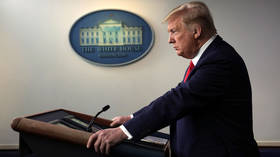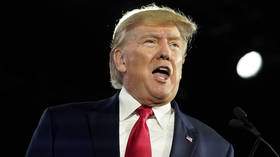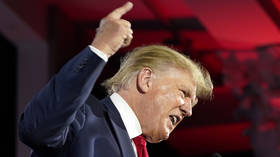Donald Trump has single-handedly killed his own 2024 chances

After just two weeks of public hearings by the House Select Committee into the January 6, 2021 insurrection, it is obvious that Donald Trump will not be the Republican Party’s nominee for president in 2024.
Trump’s crash and burn political career has now effectively come to an end, and the former president will be lucky to avoid being indicted on criminal charges by the Department of Justice once the committee has handed down its findings.
In his opening statement last week, Democrat committee chairman Bennie Thompson alleged that Trump was “at the centre of a sprawling, multi-step conspiracy aimed at overturning the 2020 presidential election.”
The evidence provided at the public hearings has already gone a long way to confirming the truth of that extraordinary charge – and much more testimony damning of Trump is expected when the hearings resume in mid-July.
The evidence given in the past two weeks shows that:
- Despite knowing that there was no credible evidence of voter fraud (then-Attorney General Bill Barr told Trump that such allegations were “bulls**t”) Trump knowingly promulgated the “stolen election” claim.
- Trump pressured Vice President Pence to refuse to certify the election results.
- This pressure was applied on the basis of dubious legal advice provided by an obscure lawyer (who later sought a pardon from Trump) that had been contradicted by Trump’s own White House legal advisers and the Department of Justice.
- Trump pressured state electoral officials into falsifying the election results.
- Trump pressured Department of Justice officials into supporting his claims of electoral fraud. At one point, he told then-acting Attorney General Richard Donoghue, “Just say that the election was corrupt and leave the rest to me and the Republican congressmen.”
- A number of Republican congressmen who tried to prevent certification of the election result in Congress later cravenly sought pardons from Trump before he left office.
- When the DOJ officials refused to comply with Trump’s demands, he threatened to appoint a compliant low-ranking lawyer, Jeffrey Clark, as acting attorney general. Only the threat of mass resignations by DOJ officials prevented this from happening.
- Trump pressured the chairperson of the Republican National Committee to appoint alternate electors who would falsely claim that Trump had carried a number of key states.
What is surprising about this litany of improper acts is that Trump committed each of them personally. They were not delegated to intermediaries – a reflection perhaps of Trump’s own paranoia, megalomania and innate distrust of others. Trump is no practitioner of the doctrine of plausible deniability.
Trump has apparently watched all the recent public hearings while bunkered down at the Bedminster Golf Club in New Jersey. His public response had so far been muted.
Trump has condemned his own daughter Ivanka for testifying that she did not believe the ‘stolen election’ claim, and denounced Republican minority House leader Kevin McCarthy for having urged pro-Trump Republicans to boycott the January 6 committee – which he quite possibly did at Trump’s own direction to begin with.
Trump now appears to be an isolated figure, who believes that he does not need to offer any substantive defence to the serious allegations of misconduct made by the plethora of credible witnesses who have appeared before the committee so far.
This fundamental error of political judgment alone should be enough to ensure the end of his political career. No matter how frankly irrational politics in Western democracies has become, politicians are still obliged to defend themselves when allegations of serious impropriety are levelled against them. Would Boris Johnson still be British prime minister if he had simply ignored the allegations of misconduct recently made against him?
It is significant that none of Trump’s former prominent Republican supporters have seen fit to publically defend him. Only the long-retired Newt Gingrich has done so.
Trump’s arrogant refusal to defend his actions has caused public opinion in America to now turn against him.
Ominously for Trump, Fox News reversed its initial partisan decision to refuse to broadcast the committee’s public hearings after the opening day’s proceedings – which attracted a substantial 20 million viewers.
Recent polls suggest that the public hearings are already having an adverse impact on Trump’s reputation. Pollster Frank Luntz said this week “I see people are no longer drinking the Kool-Aid. I see people moving away from Trump for the first time.” And Florida Governor Ron DeSantis is now outpolling Trump as Republican presidential nominee for 2024 for the first time.
The decline in Trump’s popularity may also be reflected in the fact that Trump-backed candidates have achieved only moderate success in the recent midterm primaries, and that wealthy Republican donors have deserted them.
In these circumstances – and things will no doubt get worse for Trump as the committee continues its hearings and deliberations – it seems clear that Trump cannot possibly win the presidency in 2024.
This has been apparent to sensible Republican powerbrokers for some time – which is why they have surreptitiously assisted the Democrats in using the committee hearings to bring about an end to Trump’s political career.
But the expunging of Trump personally from American politics is hardly an occasion for celebration.
As the committee hearings have made clear, it is only Trump’s own lack of political judgment that has brought about the destruction of his political career.
Test that proposition this way – assume that Trump had even grudgingly accepted his electoral defeat in 2020; assume that he had never promulgated the ‘stolen election’ lie; assume that he had not incited the January 6 riot; and assume that he had spent the last 18 months criticising the Biden regime instead of clinging to the ‘stolen election’ falsehood.
Can any sensible observer of American politics seriously doubt that, in such circumstances, Trump would now be in a very powerful position to regain the presidency in 2024?
After all, the crippling and seemingly ineradicable political and ideological divisions divisions that propelled Trump to the presidency in 2016 have only intensified since 2020 – and, more importantly, the Biden presidency has been a complete and abject failure.
America is on the verge of a recession, and significant parts of Biden’s legislative program have not, and never will be, enacted. Large numbers of working class, Hispanic, and black voters are now deserting the Democrats, and Biden continues to slide downwards in the polls.
Apart from defeating Trump, Biden’s only ‘achievements’ have been to pander to transgender activists and prolong the Russia-Ukraine conflict. No wonder Alexandria Ocasio-Cortez and the so-called ‘radical’ wing of the Democratic Party have recently refused to endorse the doddering septuagenarian as their presidential nominee in 2024.
In the past week, two Supreme Court decisions relating to America’s two most divisive political idee fixes – gun control and abortion – have further exacerbated the debilitating divisions that have characterised American politics for decades.
Democrats are now openly condemning the Supreme Court as ‘illegitimate’ for having overturned the universal right to abortion created in Roe v Wade – even though the majority decision is undoubtedly correct in terms of pure legal principle.
These critics of the Supreme Court’s legitimacy have conveniently forgotten that feminist icon and former Supreme Court justice Ruth Bader Ginsburg had for years espoused the view that the legal reasoning underpinning Roe v. Wade was untenable. They have also forgotten that the #MeToo movement was bound to provoke a conservative backlash against women.
Do these Democrats seriously believe they will make American politics more stable by attacking the legitimacy of the Supreme Court?
Trump, of course, has always been contemptuous of the Supreme Court – especially after it dismissed his attempt to legally challenge the 2020 election results. Yet this week, he cynically praised the court for overturning Roe v. Wade, and tried to take personal credit for the decision – after all, hadn’t he appointed three conservative justices to the court?
Even though Trump’s political career appears to be effectively over, millions of American voters still unconditionally support him, and continue to fervently believe the election was stolen.
Precisely how these voters will react to Donald Trump’s political demise is not yet clear – perhaps the best that can be hoped for is that they will remain broadly within the Republican fold and vote for DeSantis.
In any event, the conflict-ridden shambles that currently passes for politics in America suggests that the country’s foreseeable political future – even without Trump’s participation – is unlikely to be any more stable that its pathetically troubled immediate political past.
The statements, views and opinions expressed in this column are solely those of the author and do not necessarily represent those of RT.
















